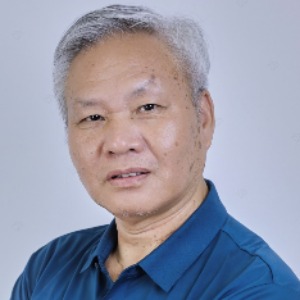Title : Treating lung cancer with the complex formula of four powerful herbs decoction for 105 patients
Abstract:
Objective: Lung cancer (LC) is a malignant tumor originating from the bronchial mucosa or gland, ranking the first among all types of cancers in clinic. As detecting methods such CT, Pet-CT, and MRI are used for diagnosis of LC, effective treatment is urgently needed to explore for the patients. In the past decades, some of new therapeutic reagents such as targeted therapy drugs and monoclonal antibody drugs were wildly developed and used in clinic for LC, the 5-year survival rate of patients has been significantly increased. However, chemotherapy drugs, targeted drugs, and monoclonal antibody drugs all have serious toxic side effects, and many patients are difficult to tolerate these treatments due to their severe myelosuppression, damage of liver and renel functions, or extensive skin ulceration. In addition, these drugs are easy to develop drug resistance and extensive metastasis occurs in patients after long-time of using these therapies. Therefore, exploring novel treatments with better efficacy and fewer side effects for LC will be beneficial to patients with LC in the world. In recent years, we have observed the clinical therapeutic effects of the complex formula of Four Powerful Herbs decoction (FPHD) on patients with LC, and obtained good outcomes.
Methods: (1) Subjects selected: A total of 105 patients with LC have been systematically observed in out-patient or in-patient units in our hospital from 2015 to 2024, and all of them have been confirmed by chest CT or MRI and tissue biopsy. There were 83 males and 22 females. The maximum age is 87 years old and the minimum age is 32 years old. There were 67 cases underwent surgery for pulmonary-lobectomy but all of them has recurrence in their remaining lung tissue or/and lymph nodes in adjacent area to the surgery site, 81 cases finished a full course of radiotherapy, and 91 patients experienced the treatments with chemotherapy, targeted drugs, and/or monoclonal antibodies before enrolled into this study, but 14 cases were not yet getting any other treatments but only wanted to take our herbal decoction after their diagnosis. All patients signed the informed consent forms. No chemotherapy, targeted drugs, and/or monoclonal antibodies were allowed after they are enrolled into this observation. (2) Treatment method: The herbal decoction is cooked from the complex formula of FPHD, and mainly contained: Honeysuckle (Jinyinhua) 30g, Radix Radix (Xuanshen) 30g, Angelica Sinensis (Danggui) 15g, Beibuuru (Chaihu) 30g, Skullcap Tablets (Huangqin) 10g, Fabanxia (Banxia)10g, Ginseng (Renshen) 10g, and so on (For details, please contact Dr. Shuangteng He by [email protected]). One dose per 2 days. Continuous dose is required every day with no interruption. The course of treatment is 30 days, and 6-12 treating course were needed. (3) Evaluation index: During the period of taking the decoction, the clinical signs and symptoms of the patient, such as cough, wheezing, chest pain, fever, appetite, stools and urine, etc., should be observed every day, and blood tests were checked every 30-day, including blood routine (BR), liver and renal function, serum tumor markers such as carcinogenic antigen (CEA), cytokeratin 19 fragment (CYFRA21-1), squamous cell carcinoma associated antigen (SCC), progastrin-releasing peptide (ProGRP), neuro-specific enolase (NSE), cancer antigen 19-9 (CA199), CA125, and CA50. Chest CT or MRI was taken every 6-month. (4) Observation period: 3-year observation starting from the day of taking the decoction. (5) Assessing the efficacy: ? Clinical cured: the mass disappears, the clinical symptoms disappear, and the tumor markers are within the normal level; ? Effective: symptoms disappeared, daily life activities including appetite, sleep, movements, urine, and stools became normal, the mass of the tumor became smaller, tumor markers decreased, and no metastases to other part of the body; ? Ineffective: exacerbation of clinical symptoms, enlargement of the mass, elevation of tumor markers, enlargement of the mass, and metastases developed in other sites.
Results: (1) Clinical efficacy: Among the 105 patients, 17 were clinically cured, 61 were effective, 25 were ineffective, and 2 died. (2) Metastasis of tumor lesions during medication: only 23 cases had lymphoid or other tissue metastasis. (3) The levels of tumor markers of serum in patients with LC including CEA, CYFRA21-1, SCC, ProGRP, NSE, CA199, CA125, and CA50 were lowered (All P < 0.05). (4) Effects of the decoction on improving clinical signs and symptoms and daily life activities: Since taking this decoction, patients generally have improved in mental state, appetite, sleep, and their clinical signs and symptoms gradually alleviated or disappeared. (5) Side effects and toxic reactions of the decoction: This formula has the side-effect of causing mild diarrhea, but it is a sign of heat-clearing and detox of this decoction, and could be well tolerated in patients. During the observation period, the blood cells, and the function of liver and kidney remained normal, and lower numbers of blood cells or abnormal function of liver and kidney were improved to the normal levels in some patients due to the use of chemotherapy, targeted drugs, and/or monoclonal antibodies before starting this decoction.
Conclusions: (1) This complex formula of Chinese herbs has a good therapeutic effect on patients with LC, and some patients have been clinically cured (17/105). (2) With this therapeutic method, the rate of metastasis of tumor lesions is largely decreased (23/105). (3) This formula had good effects on improving the mental state, appetite, and sleep, alleviating clinical symptoms, and lowering the levels of serum tumor markers for LC patients. (4) The side effects and toxic reaction of this prescription were less. During the observation period, the blood cells, and liver and renal function stayed in normal levels. In summary, this prescription has a good therapeutic effect on treating lung cancer, and we expect its good prospect in further clinical application.




